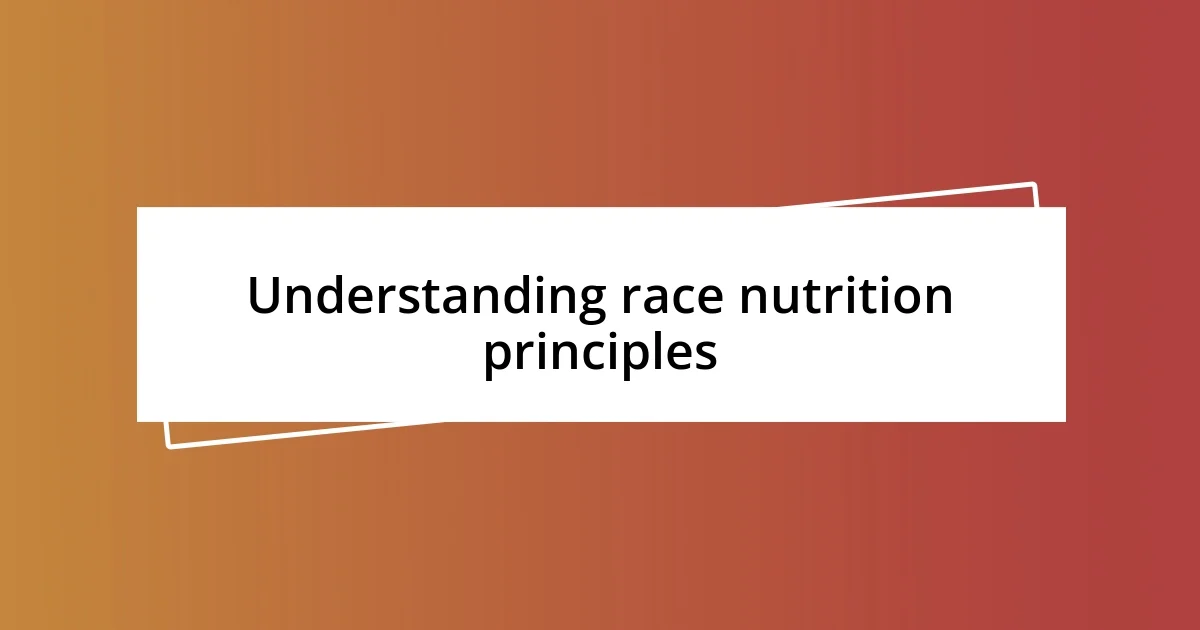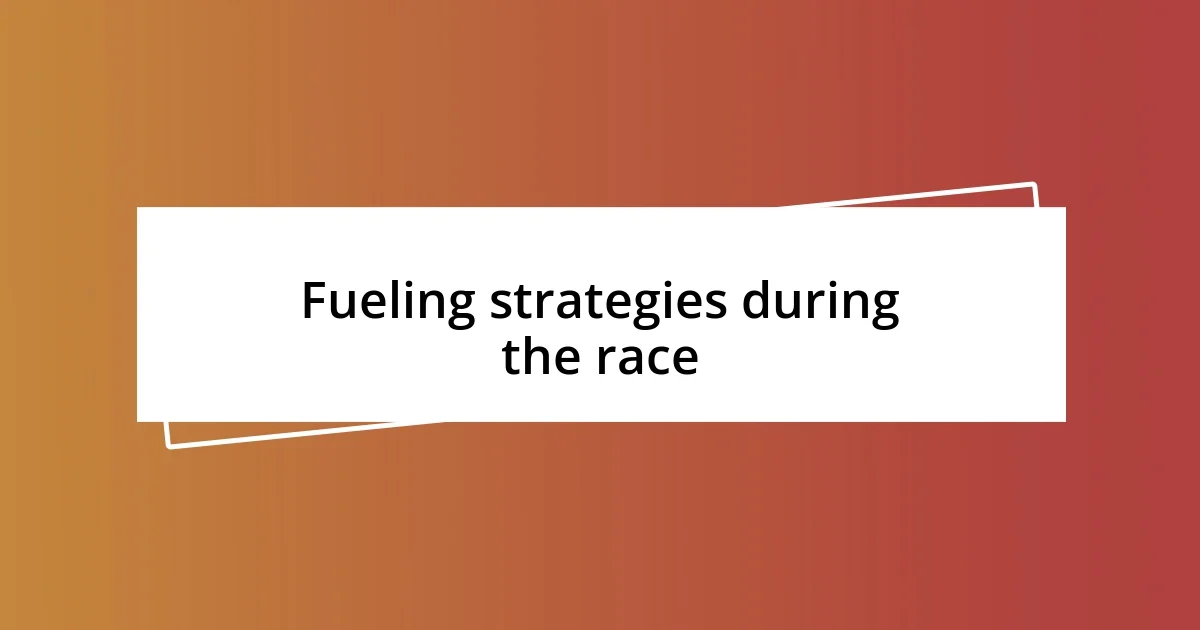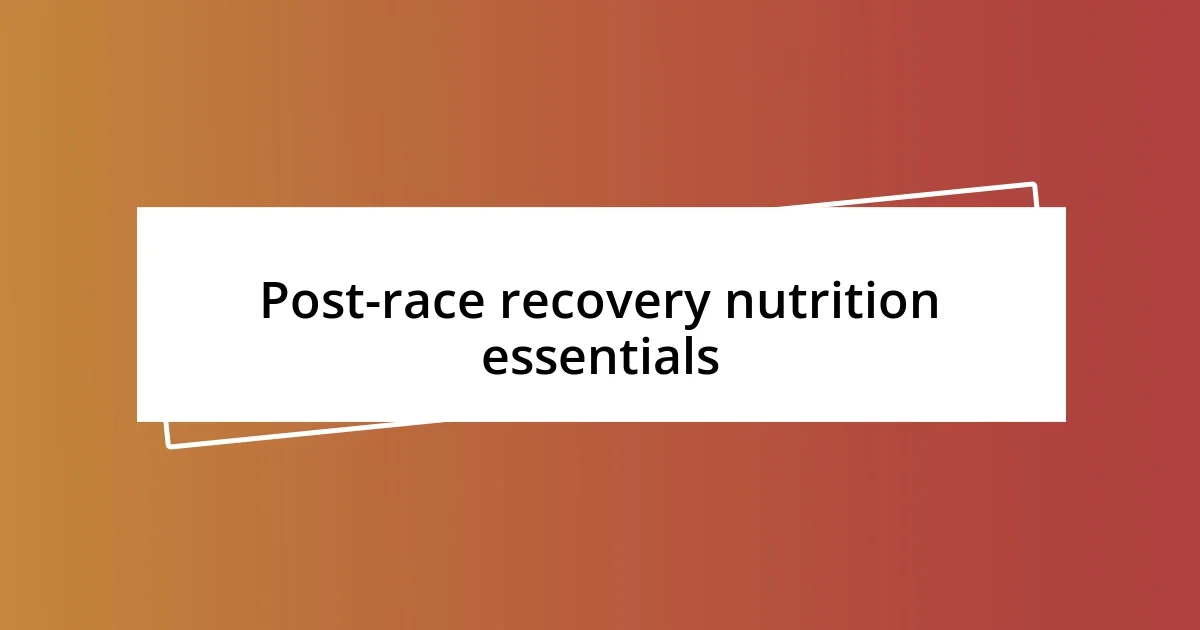Key takeaways:
- Carbohydrate timing and intake are crucial for maintaining energy levels during races; aim for high-carb snacks and meals before and during events.
- Hydration, including the use of electrolyte drinks, significantly enhances performance and recovery; plan hydration strategies carefully based on personal needs.
- Personalizing your nutrition plan through experimentation and tracking experiences can lead to improved race performance; adapt to external factors like weather and avoid heavy meals pre-race.

Understanding race nutrition principles
When I first started my journey into race nutrition, I was overwhelmed by the sheer volume of information available. It’s easy to forget that each person’s body reacts differently to fuel, right? Finding what works for you is paramount to ensuring you feel energized and focused during a race.
One principle I learned is the importance of carbohydrate timing. I remember a marathon where I hadn’t properly carb-loaded beforehand. The result? A mid-race crash that left me dragging my feet at mile 18, wishing I had fueled better. The right balance can make all the difference, especially in endurance events.
Let’s not overlook hydration, too. I used to think water was enough, but that all changed when I discovered electrolyte drinks. I felt an immediate boost during a particularly hot race; it was like I had flicked a switch from sluggish to powerful. Have you identified your hydration strategy? Understanding how and when to hydrate is crucial for optimal performance.

Importance of carbohydrates for endurance
Carbohydrates are the cornerstone of endurance nutrition. I’ve learned through countless races that they are like the fuel gauge for my energy reserves. During a particularly grueling ultra-marathon, I packed my race day snacks with high-carb options like energy gels and bananas. The difference was monumental; I could feel the surge of energy helping me tackle those steep hills with more vigor than I expected.
Throughout my experiences, I’ve found that carbohydrates not only fuel my muscles but also help maintain optimal blood sugar levels. I remember a training run where I relied solely on protein bars. Midway through, I felt my energy plummet, forcing me to slow my pace. A quick snack of quick-digesting carbs would have kept me on track. It was a wake-up call about ensuring consistent energy releases for enduring performance.
The timing of carbohydrate intake is equally significant. I typically consume a carbohydrate-rich meal about three hours before a race. This approach has worked wonders for me, allowing my body to appropriately digest and prepare for the exertion ahead. I still recall the moment I began to establish this routine; I felt the difference in both energy levels and overall race performance. This emphasis on carbs has undoubtedly shaped my race strategy, affirming their role in enhancing endurance.
| Type of Carbohydrate | Impact on Endurance |
|---|---|
| Simple Carbohydrates | Quick energy boost, ideal for immediate race fuel |
| Complex Carbohydrates | Provide sustained energy, great for pre-race meals |

Fueling strategies during the race
During a race, your fueling strategies can truly define your experience. I’ve experimented with various tactics over the years, and I’ve found that having a plan in place makes all the difference. For instance, during my last half-marathon, I focused on taking small sips of my electrolyte drink every mile. This method kept my energy levels stable and prevented any mid-race fatigue. Trust me, knowing when and how to fuel during the event takes the worry out of the equation.
Here are some fueling strategies that have worked for me during races:
- Start Early: I consume quick-digesting carbs around 10 minutes before the race begins to top off my energy reserves.
- Regular Intervals: I aim to take a gel or another carb source every 30-40 minutes—this consistency has helped me maintain momentum.
- Listen to Your Body: There have been races where I felt the need for an extra boost. Adapting on the fly has made a significant difference in my performance.
- Hydration Station Timing: I always plan my water stops according to my personal hydration needs, which can change from race to race.
Through trial and error, I’ve become more in tune with what fuels my body best during a race. And let me tell you, the joy of crossing the finish line feeling strong is worth every effort in perfecting my fueling strategy!

Post-race recovery nutrition essentials
After crossing the finish line, I find that the first 30 minutes are crucial for recovery. In my experience, a combination of carbohydrates and protein makes a fantastic post-race meal. I often reach for a chocolate milk or a smoothie loaded with fruits and yogurt. It’s amazing how quickly this replenishes my energy and helps muscle recovery. There’s something satisfying about refueling right away; it feels like a well-deserved reward.
One time, after a particularly grueling marathon, I avoided a heavy meal and opted instead for some fruit and granola bars. While I thought it was a smart choice at the time, I soon felt the aftermath kicking in—my body was aching for more sustenance! I’ve learned that balancing macro-nutrients in that immediate recovery window truly matters, and since then, I’ve made protein shakes a staple in my post-race routine. Isn’t it fascinating how our bodies communicate their needs?
Hydration is another element that often gets overlooked. I still recall a race where I underestimated my water intake post-finish and felt fatigued for days. Now, I make it a point to sip on electrolyte-rich drinks right after a race. This little habit has fundamentally changed my recovery process, allowing me to feel refreshed and ready to tackle the next adventure sooner. What simple changes could you make to enhance your recovery?

Personalizing your race nutrition plan
When it comes to personalizing your race nutrition plan, experimentation is key. I remember my first marathon vividly; I didn’t adjust my nutrition based on the weather that day. It was a hot morning, but I stuck to my usual routine, underestimating my hydration needs. That mistake taught me the importance of considering external factors like temperature or humidity, which can drastically influence how your body responds to food and water intake. Have you ever faced a similar situation?
Creating a balanced nutrition plan isn’t just about knowing what to eat before and during a race; it’s also about figuring out what doesn’t work for you. After a few races where I felt sluggish, I realized that eating heavy meals the night before slowed me down. Switching to light, easily digestible foods made a world of difference on race day. It’s liberating to discover that a simple change in your diet can elevate your performance. What have you shifted in your pre-race meals for better results?
Additionally, tracking your experiences can illuminate patterns and preferences that might not be immediately obvious. I use a journal to keep tabs on what I eat and how I feel during different races and training sessions. This habit has revealed that some gels work wonders for me while others leave me feeling queasy. By reflecting on these insights, I’ve tailored my nutrition to match my body’s unique needs. What if you started a similar routine to discover what truly fuels your success?














